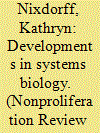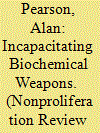|
|
|
Sort Order |
|
|
|
Items / Page
|
|
|
|
|
|
|
| Srl | Item |
| 1 |
ID:
085361


|
|
|
|
|
| Publication |
Sweden, SIPRI, 2008.
|
| Description |
vi, 40p.
|
| Series |
Sipri policy paper; no.23
|
| Standard Number |
9789185114597
|
|
|
|
|
|
|
|
|
|
|
|
Copies: C:1/I:0,R:0,Q:0
Circulation
| Accession# | Call# | Current Location | Status | Policy | Location |
| 053989 | 358.3/SUT 053989 | Main | On Shelf | General | |
|
|
|
|
| 2 |
ID:
182965


|
|
|
|
|
| Summary/Abstract |
Biological processes occur within complex, vital physiological systems. Systems biology seeks to understand how physiological systems function as a whole, integrating information about interactions in a biological system through computer-assisted modeling, aiming to identify relationships not found within individual biological units. Coupled with advances in the life sciences and computing power, this research is yielding an enormous amount of information about specific targets of vital physiological processes, and enabling predictions about how these targets may respond to a disturbance or change in signaling. This information can be greatly beneficial in treating complex diseases. It also has extended the spectrum of potential threat agents to include bioregulators, which to a great extent regulate the functioning of the nervous, endocrine, and immune systems. There is potential for misuse of the knowledge gained from these studies, and improved methods of targeted delivery of biochemicals make them more feasible weapons agents. Moreover, biochemical security concerns in systems biology are embedded within the larger domain of cyberbiosecurity. There remains a need for proactive approaches to the formulation of biochemical-security-oversight policy that would encompass developments at this interface of the life sciences and information technology.
|
|
|
|
|
|
|
|
|
|
|
|
|
|
|
|
| 3 |
ID:
075774


|
|
|
|
|
| Publication |
2006.
|
| Summary/Abstract |
Military interest in incapacitating biochemical weapons has grown in recent years as advances in science and technology have appeared to offer the promise of new "non-lethal" weapons useful for a variety of politically and militarily challenging situations. There is, in fact, a long and unfulfilled history of attempts to develop such weapons. It is clear that advances are opening up a range of possibilities for future biological and chemical weapons more generally. The treaties prohibiting biological and chemical weapons make no distinction between lethal and "non-lethal" weapons-all are equally prohibited. Indeed, a sharp and technically meaningful distinction between lethal and "non-lethal" biological and chemical weapons is beyond the capability of science to make. Thus, interest in incapacitating biochemical weapons, and efforts on the part of various states to develop them, pose a significant challenge to the treaty regimes, to the norms against biological and chemical warfare that they embody, and, ultimately, to the essential protections that they provide. Preventing a new generation of biological and chemical weapons from emerging will take concerted efforts and action at the local, national, and international levels.
|
|
|
|
|
|
|
|
|
|
|
|
|
|
|
|
|
|
|
|
|